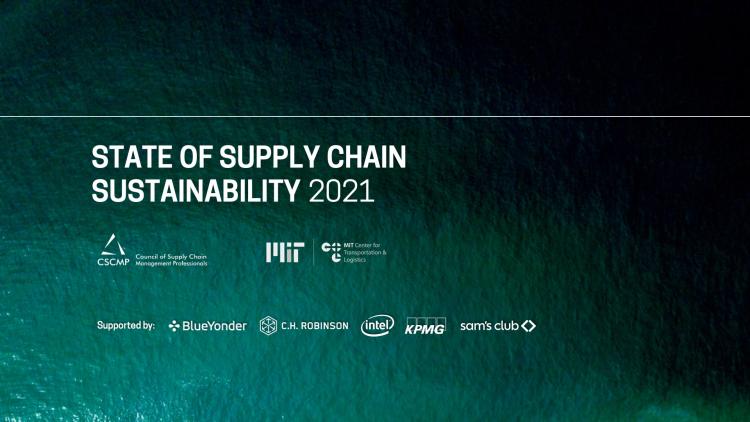
Findings from the 2021 State of Supply Chain Sustainability report indicate growing momentum for sustainability efforts in the management of supply chains
CAMBRIDGE, Mass. – The 2021 State of Supply Chain Sustainability report, published today, explores how supply chain sustainability (SCS) practices are being implemented globally and what that means for professionals, enterprises, industries, and the planet. This year’s report indicates that pressure to support SCS came from multiple sources, both internal and external to companies, but increased the most among investors and industry associations. Internally, company executives were standout champions of SCS, indicating that the growth in SCS is a business trend and not a fad.
The report is founded on a large-scale international survey of supply chain professionals with over 2,400 respondents conducted in late 2020. Survey results are combined with 21 executive interviews and supported by news and social media content analysis from the same year. The MIT Center for Transportation & Logistics (MIT CTL) and the Council of Supply Chain Management Professionals (CSCMP), a leading, global, professional membership association, collaborated on data collection in order to attain the broadest audience of practitioners and input from various sectors. This year’s report is sponsored by Blue Yonder, C.H. Robinson, KPMG, Intel, and Sam’s Club.
“We believe cooperation between sectors is vital to thoroughly understand the complexity and evolution of sustainability efforts more broadly,” said David Correll, MIT CTL research scientist. “Our work with CSCMP and our sponsors helps us to embed this essential research and its findings within the context of the real-life practice of supply chain management.”
The report findings are beginning to shed light on how supply chains are becoming increasingly recognized for their impact on a firms’ sustainability objectives and public image. “Our members tell us that now, more than ever before, that the very notion of embedding sustainable practices from within their company’s supply chain delivers real, tangible results.” says Mark Baxa, CSCMP Interim President and CEO. “Competing in today’s global marketplace is not just about the high-quality products supply chains plan, procure, make and deliver. It’s about doing the right things right for the whole of society.”
Although there are many approaches to investing in SCS according to the report, interest in human rights protection, worker welfare and safety, and energy savings & renewable energy, increased significantly over the last year. Supplier development was found to be the most common mechanism used by firms to deliver on their SCS promises.
However, there are formidable obstacles to overcome too. For example, it is notable that most of the momentum behind SCS appeared to come from large (1,000+ employee) and very large (10,000+ employee) companies covered by the research. Small- to medium-sized enterprises appeared far less committed. More work may be needed to bring them into the fold through a better understanding of the barriers they face, a possible topic for future reports.
A broader concern is that more attention from stakeholders—notably consumers, investors, and regulators—will bring more scrutiny of firms’ SCS track records, and less tolerance of token efforts to make supply chains sustainable. Improved supply chain transparency and disclosure are critical to firms’ responses, the report suggests. Read the full report online or in pdf format.
The MIT CTL/CSCMP research team is laying the groundwork for the 2022 State of Supply Chain Sustainability report. Over time this annual status report aims to help practitioners and the industry to make more effective and informed sustainability decisions. The questionnaire for next year’s report will open in September.
What the report sponsors are saying:
- “In 2021, sustainability issues were rated by our customers as the second-highest concern after capacity,” said Rachel Schwalbach, Vice President of ESG at C.H. Robinson, during interviews for the report.
- Ella Chan, Vice President of Business Initiatives at Sam's Club, noted, “We remain focused on strengthening business resilience, advocating for climate action, and reducing emissions in our operations.”
- Adam J. Schafer, Director of Supply Chain Responsibility at Intel, said, “When things shut down in China because of Covid-19, that slowed us down in terms of addressing our 2020 audit completion goals, but the impact on the sustainability movement overall was limited.”
- “With an increased focus on corporate ESG efforts, we have seen a progression towards a broader scope and accuracy of reporting. We are also sensing a shift in the drivers of sustainability from responding to external pressure to an opportunity for market differentiation.” says, Rob Barrett, Principal, US Supply Chain Advisory Leader, KPMG
- Hong Mo Yang, Senior Vice President and General Manager of Manufacturing Sector, Blue Yonder said, “Supply chain professionals have a large role to play in driving sustainability as one of the top metrics being tracked for the health of the business. How supply chain professionals respond (short- and long-term) in terms of different scenarios has a lasting impact on sustainability.”
Press contacts: David Correll dcorrell@mit.edu, Ken Cottrill kencott@mit.edu
About MIT CTL
The MIT Center for Transportation & Logistics (MIT CTL) has been a world leader in supply chain management education and research for nearly 50 years. MIT CTL has made significant contributions to the field of supply chain and logistics management and has helped numerous companies gain competitive advantage from its cutting-edge research.
About CSCMP
The Council of Supply Chain Management Professionals (CSCMP) has been the preeminent worldwide professional association dedicated to the advancement and dissemination of research and knowledge on the supply chain management. With CSCMP members located around the world representing nearly all industry sectors, government, and academia, CSCMP member receive unparalleled networking opportunities, cutting-edge research, and online and on-site professional educational opportunities.